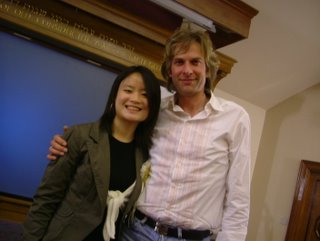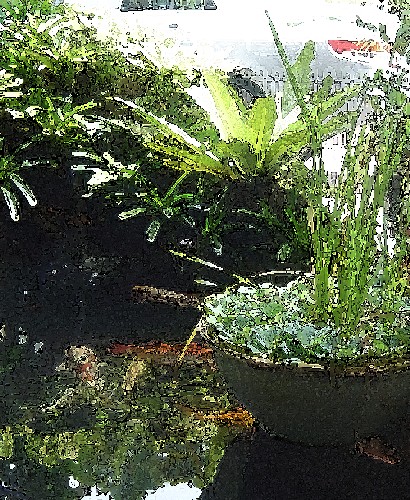It's pretty unorthodox to put up an entire article on your blog, but oh well, here goes. I was lucky enough to be able to meet Adam Curry, pioneer of podcasting. If you haven't downloaded Pete Tong's Tongcast yet, do so now! You can find it on iTunes, his latest (No. 3) is really good. Also, this is one of the funnier podcasts I've heard recommended by none other than Mr Curry himself: It's Madge Weinstein's Yeast Radio; yeah really long name. Anyway, here's the article:

At the age of 14, Adam Curry built his first transistor radio and made his mom drive him around the block to see how far it would reach. Soon he was putting together home-made mixers and turntables, adding a mike to those later on to begin broadcasting to the kids around his neighbourhood.
Not many people I’ve heard of can boast of a CV like Curry’s. Starting off as the host of a weekly pop-music television program based in the Netherlands, where he grew up, he moved to New York in 1987 when MTV offered him a job as one of their VJs. He may have had plenty of pre-adolescent teeny-boppers swooning at his feet thanks to the shaggy blond mane he sported back then. But now, at 41, he’s creating waves of a different kind.
When we meet, I notice that Curry’s still got the same hairstyle albeit there’s much less of the volume which pretty much characterised the 80s. He’s dressed in a pair of light blue jeans coupled with a simple buttoned-down white shirt. Sounds like your average tech-geek to me. But a second glance allows me to notice a pierced right ear, rimless glasses, a silver bracelet on his right hand, a gold Rolex on his left and get this, a pair of black Ugg boots.
After being with MTV for 7 years, Curry quit one day to “check this Internet thing out”. He invested $500,000 in OnRamp Inc, a Web design and hosting company which he co-founded. Right before the Internet bubble burst in 1999, he sold it for $350 million, moved his family back to the Netherlands, bought a castle, bought a helicopter, learnt to fly one and all that other crazy dotcom stuff.
Curry has been shaking up the broadcasting industry of late with a brand new concept he helped pioneer called ‘podcasting’. In August this year, Curry’s new San Francisco-based company, snagged a sum of $8.9 million in venture capital from Kleiner Perkins Caufield & Byers and Sequioa Capital, the same bunch of people who backed Yahoo! and Google back in the 90s.
“There’s really a lot of interesting stuff on the Internet like talk shows and interviews. I found it really tiresome to go look for it, find it, see if there was anything new, download it, wait, wait, wait…. and then put it into iTunes and wait some more for iTunes to put it into your iPod,” says Curry.
So he talked to some software developers and asked if there was something that could be done to make all this automatic. Eveyone said that it was really easy but the problem was that none of them actually bothered to do it. So Curry decided to do it himself, put it out on open source upon completion one day and four hours later there were 20 developers who were hooked on to it. Not stopping there, he decided to put up The Daily Source Code, a daily geek-speak update for those working on the program, quite similar to a radio show which would pop up on your iPod everyday.
“A week later, I received emails from people saying that they loved my show….and they’d started making their own as well. After some time of listening to other people’s shows, I realised that I’d created magic.” And magic it is. Curry has created a new hybrid for conventional radio programmes. Not only can you download your favourite show and listen to it as and when and where you want to, you can also create your own –all you’ll need is a mike and some basic audio programming software which you’ll be able to download for free of the Internet.
So in a nutshell, podcasting is a sort of audioblog. Curry is subscribed to almost 300 different podcasts citing a mix of political and comedic podcasts, one of them being Yeast Radio (a podcast fronted by an angry Jewish lesbian with a yeast infection). He favours non-mainstream podcasts as opposed to those produced by the Wall Street Journal and MSN’s Slate.com because “I like stuff that’s breaking and burping -normal stuff that human beings do.”
I ask Curry why he’s so convinced that a future in podcasting is so financially viable when its predecessor, the weblog, hardly boasted any capital gains. “Weblogging stemmed from the inherent desire for people to publish. It’s not like all of a sudden, print sucks,” he replies. On the other hand, Curry says that radio, specifically radio in America, sucks big time. So there’s an actual demand for quality radio broadcasts. That’s the primary reason why podcasting has taken off in America. For avid Brit-radio fans and Pulse.com evangelists, the trend hasn’t taken off completely in the UK because according to him, “Radio doesn’t suck as bad here.”
So how exactly does Curry plan to turn PodShow Inc into the next Google? The answer lies in advertising. $30 billion is spent annually on radio ads and its been estimated that internet audio advertising will capture 3% to 4% of all radio advertising over the next 5 to 10 years. The ‘Podfather’, a name bestowed unto Curry by a fellow software developer, predicts a future reversal of roles. Instead of radio show managers running around for advertising revenue to fund their stations, big firms will soon have to audition for advertising opportunities on podcast shows – an elevation of sorts for podcasters to rockstar status.
Speaking of rockstars, Curry boldly predicts that “…within 18 months, the music business will crumble.” With illegal downloads escalating exponentially these days, that’s not too far-fetched an idea. He talks about another brainchild of his, the Podsafe Music Network, through which bands authorise podcasters to use their music for free on their shows. “I have150,000 people listening to my podcast. If I play a song 3 times a month, that song will sell at least a thousand copies –it’s been proven. If a song is played on a thousand podcasts with each having a thousand listeners, you’ve effectively got a million spins. That’s unheard of in radio land and there’s undoubtedly going to be that 1% at least who’s going to go out and buy the actual record.”
Let’s do some more simple arithmetic: Judging from current market conditions, PodShow Inc has few competitors. If podcasting takes off successfully, Curry and his team are bound to be eating a very large portion of the $1.2 billion advertising cake. So here we’ve got a guy sitting in front of a PC, talking to himself into a mike, sounds pretty sad if you ask me. But contrary to that, Curry has evidently added a cool-factor and a spunky, avante garde dimension to an otherwise mundane technological innovation. So if the venture capitalists got it right, Curry could be flying over England in the near future with another new helicopter and perhaps making an aerial search for an English castle.


1 comment:
You have an outstanding good and well structured site. I enjoyed browsing through it homes to rent in west palmdale ca Topamax and abdominal pain mandy eats cum Emergency phone products Gay and man
Post a Comment